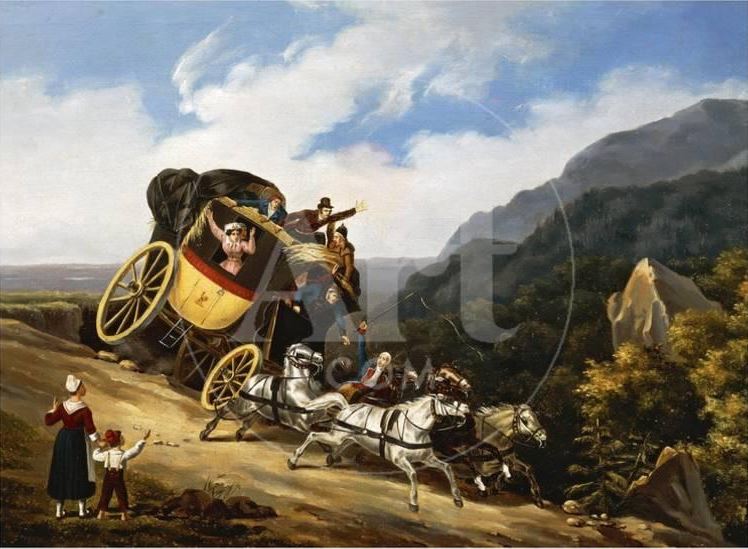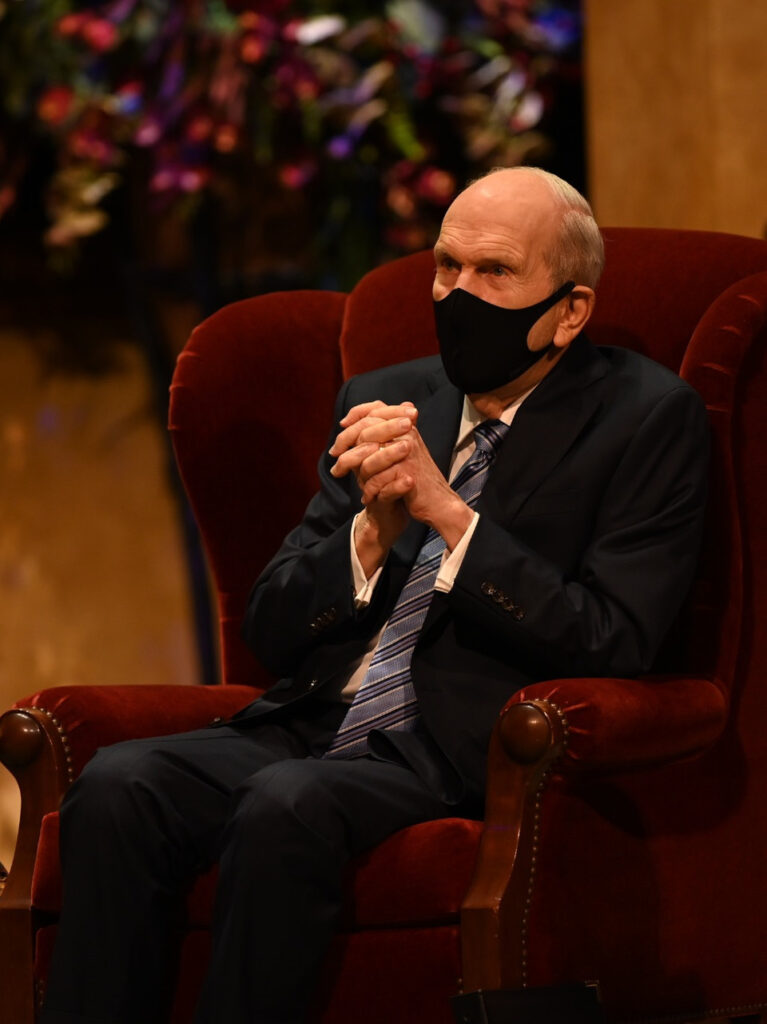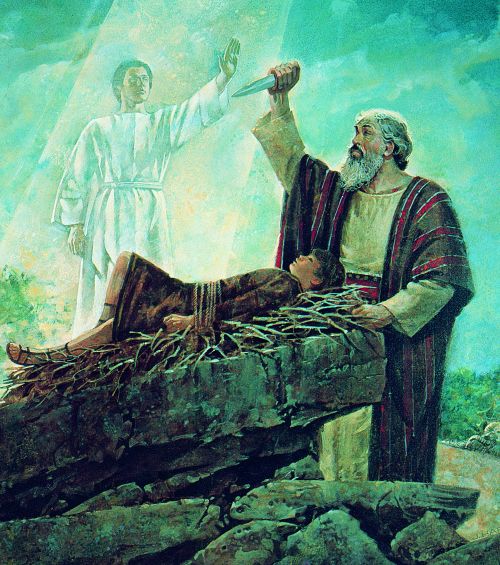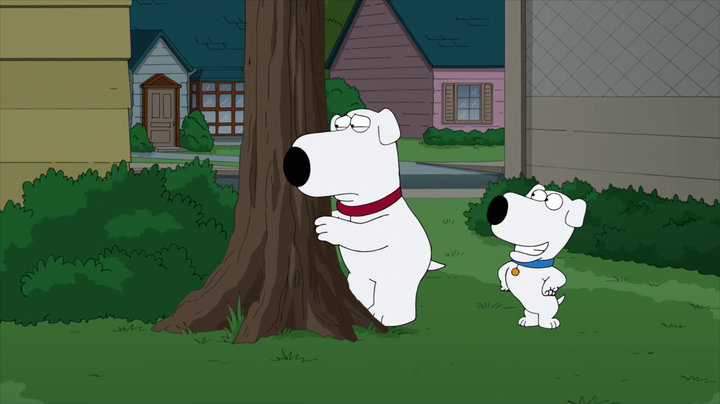Is the above dog in danger? Could he possibly get even closer? Doesn’t he have the right to get as close as he wants? Wouldn’t doing so prove his independence and manhood (or doghood, in this case)? What would his mother have told him?

After making his own decision on the subject, this dog’s mother would probably tell him not to come home anytime soon.
What’s the point? Before suggesting some practical applications to our own lives, may I share a story told by George Reynolds and Janne M. Sjodahl in their Commentary on the Book of Mormon:
In the old days before good roads, an owner of a stage line advertised for a competent and careful driver. Three men … answered, and them he took to a high mountain pass overlooking a steep cliff. The road … narrowed down as it negotiated a turn. To the first, he said, “How near can you get to the edge of that cliff and not go over?” The owner of the stage line was assured that the job’s prospect could go almost to the edge of the cliff, and not any farther. “Good,” said the inquirer, and asked the second applicant the same question. “I can get my back wheels over the cliff, and still regain the roadway.” That was still better. But the third man in answer to the same question, replied: “I don’t know how near the edge I can go, but I will stay as far away from it as I can.” He got the job. (George Reynolds and Janne M. Sjodahl, Commentary on the Book of Mormon, edited and arranged by Philip C. Reynolds, 7 vols., 7:270.)

Few of us will likely be tempted to drive with our back wheels over the edge of a cliff. But, some of us fall prey to even more dangerous yet more subtle temptations. We ask such questions as:
- How much of the Super Bowl can I watch without seriously breaking the Sabbath?
- Is it okay to drink decaffeinated coffee?
- Can I pay my tithing on my net income, or does it have to be on the gross?
- How much do I have to pay in fast offerings each month, if I normally don’t eat breakfast on Sunday anyway?
- How intimate can a young unmarried couple get without disqualifying themselves for a temple recommend?
- Do I really have to listen to every general conference session? Is it necessary to keep Saturday holy, too, or just Sunday?
- How often do I have to attend the temple to be considered a member in good standing?
- How early do I have to put on a mask in sacrament meeting? Can I wait until the conducting officer gets up to start the meeting, since up to that point I haven’t technically been in a “public meeting”? Can I take the mask off as soon as the closing prayer ends? Does the mask have to cover both the nose and mouth, or is one or the other sufficient? The Prophet didn’t really specify, did he?
What do all of these questions have in common? All manifest an obsession with the letter of the law and an abysmal ignorance of its spirit. They are more suited to ancient Israelites, whom the Lord let wander in the wilderness for forty years, than to modern Israel, which has been invited to live a higher law and qualify for commensurate blessings. We might instead want to rephrase the above questions to read something like the following:
- How can I maximize the benefit I get from Sabbath observance and show the Lord I really love Him on His holy day?
- How can I stay as far away from the appearance of evil as possible and avoid the possibility that anyone who looks to me as an example might be encouraged to compromise his principles?
- How can I be as generous with the Lord as He has been with me, and as I hope He may be in the future?
- How can I best protect myself and my future spouse from even the possibility of transgression and show the Lord how much I value sacred powers of procreation that I would want to be entitled to exercise eternally?
- How can I arrange my schedule so I can listen uninterrupted to all ten hours of wonderful, inspired messages from our prophets, seers, and revelators?
- How can I find time to be in the temple even more often than I am and have the joyous experiences available there?
- How can I show the Lord my faith in and gratitude for living prophets by enthusiastically going the extra mile and setting an example in following their counsel by potentially erring on the side of over-masking, rather than risk doing less than they would expect?
I confess that the catalyst for my writing this article was my disappointment at seeing too many of those who have promised in temple recommend interviews to sustain the President of the Church as a prophet, seer, and revelator be slow to accept his guidance in the matter of wearing masks in public meetings.

A major test of this life is not particularly whether we enjoy hearing from our prophet when he offers sweet sermons with which we already agree, but whether we will follow him when he asks us to do something we find disagreeable. The Lord didn’t ask Abraham if he wouldn’t like to be free of the responsibility to have to care for a son in his advanced years and tell him he had an option. He knew how much Abraham loved Isaac. He had waited for him for a hundred years. And he knew how much Abraham hated human sacrifice, almost having lost his life to it at the hands of his own father. So, the Lord devised the perfect test for Abraham. He asked him to give up that which he loved most by doing the thing he most hated.

How did Abraham do on his test? He didn’t grudgingly drag his feet during the three day journey to Mount Moriah. Rather, he arose early in the morning and set out quickly to be strictly obedient, no matter how much his heart was aching inside. Once Abraham had shown his willingness to follow through, the Lord was able not only to tell him he could keep Isaac but promise him additional posterity in time and eternity, eventually outnumbering the sands of the sea or the stars of heaven.
How will the Lord test our fitness for similar eternal blessings? Surely it will include an assessment not only of our willingness to obey the letter of the law, looking for all possible loopholes, but of our eagerness and enthusiasm to go the extra mile in showing our love for the Lord and gratitude for the guidance He gives us, not only in the scriptures but through His living prophet. Paul said, “He which soweth sparingly shall reap also sparingly; and he which soweth bountifully shall reap also bountifully. Every man according as he purposeth in his heart, so let him give; not grudgingly, or of necessity: for God loveth a cheerful giver.” (2 Corinthians 9:6 – 7) Moroni was even more blunt: “For behold, if a man being evil giveth a gift, he doeth it grudgingly; wherefore it is counted unto him the same as if he had retained the gift; wherefore he is counted evil before God.” (Moroni 7:8)

But do we really have to blindly follow the President of the Church? Aren’t we supposed to seek our own revelation? In the Church of Jesus Christ of Latter-day Saints, we indeed talk much about our right and responsibility to receive personal revelation to guide our lives. But such personal revelation will always be within the bounds of previous revelation given through prophets. It will direct us in ways to apply such previous revelation. It will never provide justification to ignore it.
If we have doubts about President Russell M. Nelson’s current counsel regarding vaccination and the wearing of masks or any other direction He has given us, we may profit from a lesson learned by Elder Marion G. Romney, a former member of the First Presidency. Elder Romney, in addition to being a Church leader, was much involved in politics. Sometimes he found that the pronouncements of the First Presidency on social or political matters conflicted with his own ideas. On one occasion, Church leaders issued a “tersely worded editorial,” denouncing “the trends of the political administration then in power,” a position at odds with Elder Romney’s own persuasions. He recounted, “When I read that editorial, I knew what I should do-but that wasn’t enough. I knew that I must feel right about following the counsel of the Church leaders and know that they were right. That took a whole night on my knees to accomplish.” (Marion G. Romney, Improvement Era (October 1962): 713-15, 740, 742, 744.)

If we have concerns about President Nelson’s latest counsel or any other instruction from the Lord, we can approach Him directly, as Elder Romney did, for confirmation of its correctness. If it takes us a night on our knees, as it did Elder Romney, it will be time well spent.
On this same subject, Robert L. Millett, former Dean of Religious Education at BYU, wrote:
There is another matter that prevents many of us from enjoying the Spirit of the Lord in our lives as we might: the tendency to live on the edge, to play percentages with God, to tempt fate and to place ourselves in circumstances that can contribute to our spiritual undoing. There are those who want to see how far they can go without going all the way; those who want to drive the vehicle as close to the edge of the cliff as possible with no intention whatever of falling; those who cunningly creep up on the flame with no intention of ever being burned; those who want to enjoy all the privileges of Babylon but at the same time keep their citizenship in Zion intact. I promise you that there is no lasting happiness in such approaches to life, but rather a type of moral or spiritual schizophrenia. Too many people want to be good, but not too good; others want to be bad, but not too bad. Some want to serve the Lord without offending the Devil. As my colleague Brent Top once observed, one cannot “dance and dine in the great and spacious building” and still hold on to the iron rod; clinging to the iron rod requires both hands, as well as both heart and soul. James taught that “a double minded man is unstable in all his ways” (James 1:8). We would do well to stay as far away from sin and compromise as we can, to not only avoid evil but also the very appearance of evil (see 1 Thessalonians 5:22). Prevention is far, far better than redemption. (Robert L. Millet, Selected Writings of Robert L. Millet: Gospel Scholars Series , p.351 – 352.)
If we eagerly follow the lead of the Lord and His prophets, we will never have to answer the question posed in the title to this article. We will know that it is wisest to stay well away from both skunks and sin. May the Lord bless us so to do.

